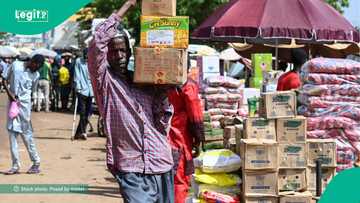Tax Expert Asks Northern Governors to Embrace Tinubu’s Tax Reform Bill
- The 19 northern governors have asked to embrace the Tax Reform Bill Initiative by Tinubu’s government
- Tax expert Arabinrin Aderonke made this appeal in an open letter issued on Tuesday, October 29.
- The new VAT model would, in essence, redirect funds from locally generated goods and services back to their origin communities
CHECK OUT: Education is Your Right! Don’t Let Social Norms Hold You Back. Learn Online with LEGIT. Enroll Now!
An appeal has been made to the 19 northern governors to accept the proposed Tax Reform Bill, highlighting potential benefits for local communities.
Tax expert Arabinrin Aderonke made this appeal in an open letter issued on Tuesday, October 29, 2024

Source: Facebook
New bill to promote prosperity
She cites Zacch Adedeji, the IRS boss who has repeatedly clarified that the reform is intended to “tax prosperity, not poverty
PAY ATTENTION: Legit.ng Needs Your Help! Take our Survey Now and See Improvements at LEGIT.NG Tomorrow
Aderonke cites Zacch Adedeji, the Executive Chairman of the Federal Inland Revenue Service (FIRS), who has repeatedly clarified that the reform is intended to “tax prosperity, not poverty.” According to Adedeji, the proposed changes aim to streamline tax systems, reduce burdens on small businesses, and improve compliance, enabling “businesses, farmers, and traders alike” to thrive without excessive taxation.
Boosting local economies and infrastructure
Essentially, the new VAT model would redirect funds from locally generated goods and services back to their origin communities. For Northern Nigeria, revenue collected within the region would support development projects like roads, schools, and hospitals, stimulating local businesses and encouraging investment.
“This model is an opportunity for sustained growth that benefits both communities and the local economy in a meaningful way,” Aderonke states.
The derivation-based system stands in contrast to the centralised model currently in place, offering Northern Nigeria an opportunity to capitalise on its unique resources. This approach bolsters local infrastructure and encourages self-sufficiency, reducing reliance on other regions.
“This bill will help develop the region into a prosperous North,” Aderonke emphasises, highlighting how it could leverage the North’s natural advantages and build upon its strengths.
Transparency and Renewed Hope for Taxpayers
Beyond financial benefits, Aderonke underscores the bill’s promise of transparency in tax administration, a point supported by Dr. Adedeji.
She advocates for a tax framework where taxpayers can witness improvements funded by their contributions, fostering trust within the system.
“This is about a fairer, simpler tax system that not only empowers businesses but also respects and values taxpayers' contributions,” he asserts.
With this reform aligned closely with President Bola Tinubu’s Renewed Hope Agenda, which envisions equitable development across Nigeria, Aderonke calls upon Northern governors to consider the bill’s long-term advantages for the North.
Read the full text below:
Tax Reform: Open Letter to Northern Governors
Your Excellencies, Governors of Northern Nigeria states,
I write to you with a shared vision: building a prosperous, fair, and united Nigeria. Understandably, there are concerns about the recent Tax Reform Bill, especially regarding the proposed shift to a derivation-based model for VAT distribution and how it might impact Northern states.
However, looking more closely at this reform reveals opportunities to benefit Northern states and the nation. With your leadership and support, I believe this reform could unlock opportunities that advance the North’s growth and empower its communities. I wish to share some perspectives on the vision and benefits of this reform.
According to Dr. Zacch Adedeji, Executive Chairman of the Federal Inland Revenue Service, backed by the Federal Government, this reform's purpose is not to create new taxes or burden the everyday citizen. He states, and I quote, "This reform is about taxing prosperity, not poverty." In clearer terms, the reform ensures that those with greater means and profits contribute fairly while reducing redundant taxes impacting small businesses and local communities. This streamlined approach offers simplicity, making tax compliance more accessible and efficient for companies, farmers, and traders, allowing our local enterprises to grow without unnecessary hindrances.
What does this mean for Northern Nigeria? In practical terms, a derivation-based VAT model would redirect funds from locally generated goods and services into the communities that produce them. Resources collected in the North would be reinvested directly into Northern infrastructure like roads, schools, hospitals, and other development projects. Such reinvestment can create a real impact: stimulating local businesses, attracting new industries, and generating more regional wealth over time. This model is an opportunity for sustained growth that meaningfully benefits communities and the local economy.

Read also
No more grid collapses: Jeff Bezos, Rockefeller move to invest in Nigeria’s electricity industry
VAT revenue has been centralized in the past, but this reform offers a new direction, allowing each state to gain more from its economic activities. A localized VAT model values each region's strengths and contributions to the country and ensures that these efforts benefit local communities directly. It’s a way to support each state’s growth and allow funds collected within a state to impact its residents significantly. I understand your concern, but the new bill will help develop the region into a prosperous North if you look inward in line with the following: One, it will strengthen the North more to focus on some of the things they have the comparative advantage of and make them stronger. Two, it will make the North more creative in developing what they have instead of relying on other sections of the country for progress and development. Third, it will also make the North look inwards into their ability and capability to develop themselves.
Additionally, the reform seeks to establish transparency and accountability in tax administration, addressing past inefficiencies that have created distrust in the system. A more transparent framework ensures taxpayers can see tangible improvements from their contributions. Dr. Zacch, again, has said, and I quote, “This is about a fairer, simpler tax system that not only empowers businesses but also respects and values taxpayers' contributions."
Let’s not forget that President Bola Tinubu's Renewed Hope Agenda seeks to bring transformation that empowers every region. The proposed tax reforms align with this vision by creating an efficient, transparent tax system geared toward prosperity.
So, as trusted leaders, I encourage you to consider these reforms for the present and for the potential they unlock for a prosperous Northern Nigeria. With your guidance and influence, we can pave the way for a Nigeria where all regions feel seen, valued, and fairly treated. This bill offers a foundation to build a stronger North and a unified Nigeria.
Thank you.
FIRS rakes in N5.5 trillion in tax revenue in 6 months
Legit.ng earlier reported that FIRS collected a total tax revenue of N5.5 trillion for the six months from January to June 2023.
Legit.ng earlier reported that FIRS set a new record after collecting over N10 trillion in revenue in 2022.
It was the first time the revenue agency crossed the N10 trillion mark in tax revenue collection.
PAY ATTENTION: Сheck out news that is picked exactly for YOU ➡️ find the “Recommended for you” block on the home page and enjoy!
Source: Legit.ng







